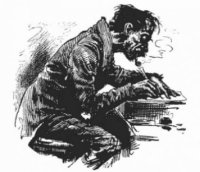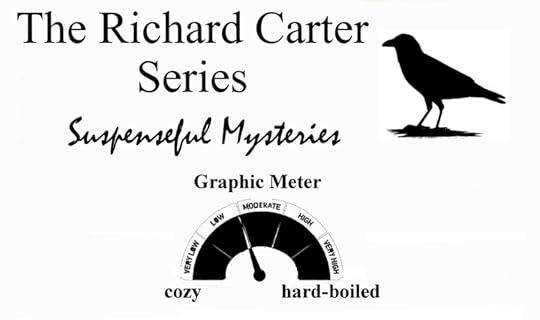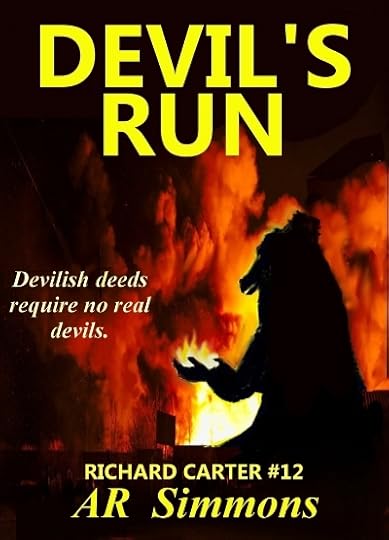A.R. Simmons's Blog: Musings and Mutterings, page 9
July 16, 2017
Pilot: Richard and Jill; Wants Versus Needs

The last thing Richard Carter needed was the death of his dream. So it is no wonder that Richard is adrift after his felony homicide pardon kills any chance at a career in the FBI. But the woman he loves, the one he risked and willingly gave up all to save has miraculously chosen him to be her life mate. That should be enough for any man. Yet unreasoning depression has seized him. Unable to hold a job and increasingly dysfunctional as a husband, he is becoming the last thing his young wife needs.
His dream may be dead, but not Jill’s. Stubbornly determined, she makes the best of their circumstances, encouraging and supporting her husband even as she works as a graduate assistant and prepares to enter a prestigious doctoral program. Looking at it dispassionately, a promising career in academia is ahead of her if she disentangles herself from the damaged soldier she has married. That, however, is not who Jill is.
She has another dream. Having been abandoned by her quarreling parents, and raised by a loving maiden aunt, she is determined to heal Richard’s psychic wounds and have a fully-functioning family. If their marriage fails, as it seems to be on the way to doing despite their deep love for each other, it won’t be because Jill gives up.
Richard is not so sure. He may be an emotional basket case, but he is not so self-absorbed that he doesn’t see the burden he has become for Jill. Now, he fears that he is dragging Jill down to his “nothing life” and keeping her from attaining her dreams. Knowing how intelligent she is, he is sure that she is hiding her resentment because she fears his emotional collapse should she leave him. He even suspects that she has married him and is staying with him out of gratitude for his having saved her life. As depressing as the thought is, he thinks that she will probably come to her senses and leave him, something she would be better off doing.
Despite their increasingly dysfunctional physical relationship, they are still deeply in love with each other. Jill is rock-solid in her commitment to Richard, not from pity or gratitude, but because she needs him. She is literally Richard's lifeline, but he loves her enough to let her go.
This is how things stand when Richard commits himself to a stranger who turns to him for help in finding her missing baby. As his amateur sleuthing draws him deeper into the case, Jill fears and resents the woman’s hold on him even as she recognizes that the case has pulled him momentarily from his depression. Despite the new-found purpose he has found, she senses impending disaster when his efforts fail, but is powerless to prevent him from pursuing what has become an obsession for him.
At the end of the second story, Jill does what Jill does. She sees clearly that choices have to be made. It has become a case of needs versus wants. She weighs options and chooses the path that will give them the best shot at gaining what they both need rather than what either one of them wants. After all, they are one flesh.
Published on July 16, 2017 04:43
•
Tags:
characters, evolving-characters, mystery, ptsd, realistic-characters, series, suspense
July 12, 2017
Concept; Richard and Jill Are Born
People are born, grow, adapt, and evolve. So do believable characters. Richard Carter and Jill Belbenoit were born of a concept—the initial question that became the premise of my first novel was “Can trust betrayed ever be regained?” Being a novice despite my age, I concocted a great plot to explore that question. Then I proceeded to write a truly horrible book—horrible because it was totally unbelievable. The most unbelievable part was the reaction of Jill. She was deceived and terrifyingly betrayed, and yet she got over it simply by getting to know Richard. Can’t work, won’t work. Didn’t work.
The problem was that I was trying to make one and one equal three. I needed to connect the third side of this triangle. Jill needed a more compelling reason to do what she ended up doing. Furthermore, her feeling of betrayal could not disappear without a trace. After all, our pasts are part of us—forever. The solution was to let Jill become a more complex and conflicted person. In striving to understand her, I discovered that there was a role reversal. She became the stronger of the two. In Bonne Femme what could have been a damsel-in-distress cliché became a story of alliance and mutual protection.

By the end of the story, Richard and Jill have changed. Once again, as he did at the beginning of the story, Richard decides what must be done for Jill’s sake without discussing it with her. This time, she will have none of it because she sees the truth. The two of them are committed to each other so intensely that their marriage is only a formality. They have become, as Jill says, “one flesh.”
But all is not “hunky dory.” Too much has happened to them for the path ahead to be smooth. Jill is psychologically scarred and Richard is a near basket case. He came into this story suffering from PTSD. But soldiers are not the only ones subject to it. Its seeds lay dormant in Jill.
By the end of Bonne Femme, I could literally hear and observe Richard and Jill. It may sound fantastic, but I found that I could let them live the story. Of course I created the scenes, but they determined the dialog and Jill especially refused direction when I tried to have her to do things out of character. No, I’m not on meds—or off them for that matter.
[Next: Richard and Jill; Wants and Needs]
The problem was that I was trying to make one and one equal three. I needed to connect the third side of this triangle. Jill needed a more compelling reason to do what she ended up doing. Furthermore, her feeling of betrayal could not disappear without a trace. After all, our pasts are part of us—forever. The solution was to let Jill become a more complex and conflicted person. In striving to understand her, I discovered that there was a role reversal. She became the stronger of the two. In Bonne Femme what could have been a damsel-in-distress cliché became a story of alliance and mutual protection.

By the end of the story, Richard and Jill have changed. Once again, as he did at the beginning of the story, Richard decides what must be done for Jill’s sake without discussing it with her. This time, she will have none of it because she sees the truth. The two of them are committed to each other so intensely that their marriage is only a formality. They have become, as Jill says, “one flesh.”
But all is not “hunky dory.” Too much has happened to them for the path ahead to be smooth. Jill is psychologically scarred and Richard is a near basket case. He came into this story suffering from PTSD. But soldiers are not the only ones subject to it. Its seeds lay dormant in Jill.
By the end of Bonne Femme, I could literally hear and observe Richard and Jill. It may sound fantastic, but I found that I could let them live the story. Of course I created the scenes, but they determined the dialog and Jill especially refused direction when I tried to have her to do things out of character. No, I’m not on meds—or off them for that matter.
[Next: Richard and Jill; Wants and Needs]
Published on July 12, 2017 08:39
•
Tags:
characters, evolving-characters, mystery, ptsd, realistic-characters, series, suspense
July 9, 2017
Notes From a Sleepy Town

I am a true-crime and forensics aficionado. I enjoy a good mystery, and devour detective and police procedural TV shows, movies, and books. I love to follow an unfolding story, to evaluate evidence and testimony, to second-guess the investigator, and to discover the perpetrator. I find the presentation of evidence fascinating, although the TV practice of recapping after each commercial break wearies me.
There is one feature of TV crime shows, however, that I don’t like. In fact, it drives me to distraction. I call it the “sleepy town cliché.” As I settle into my recliner, the narrator sets the mood with something like this: “On a warm June night in 1989, an act of brutality fractured the tranquility of sleepy little Midville, a town where no one locks their doors at night, and where keys are routinely left in vehicles. All the comforting assumptions of the close-knit community suddenly evaporated on that summer night when unimaginable horror became incomprehensible reality. The town’s inhabitants could barely fathom the tragedy, and sleepy little Midville would never be the same.”
That’s all good if Midville is one of those hamlets that really is just a “wide spot in the road.” But no. It turns out that Midville has a population of ten thousand.
Okay. I get it. Any place with less than fifty thousand people is small when contrasted to the metropolitan communities in which most of us live. But folks, it’s not that small. Everyone in a town the size of Midville knows everyone else and trusts them? Really? I live in a “Midville,” but if I’m supposed to be on intimate terms with everyone in town, I am failing my social responsibility. Heck. I don’t even know all their names.
The other day, the front page of our daily paper featured mug shots of twenty area people arrested in a drug sweep. Would you believe that I didn’t recognize a single face? Of course, mug shots do a person about as much justice as a driver’s license photo. Still, in a “sleepy” little town like ours, you would think I’d recognize one or two of them. Not only did I not recognize any of the new celebrities; I couldn’t place a single name. I have a decent memory, but honestly, I’m incapable of remembering ten thousand names. I’m probably not even remotely familiar with more than a few hundred of them. It’s analogous to the number of my Twitter followers who might recognize my face or name. The thing is, I’m probably about as good at this recognition thing as most people in my town.
So much for the intimate town of ten thousand myth. How about that proverbial small-town trust? I’d wager that our town has the same percentage of people who engage their auto alarms as does Chicago. If we leave our doors unlocked at night, it’s probably an oversight. And leaving the keys in the car is becoming about as rare here as “double cousins” (the once common practice of a brother and sister pair marrying a sister and brother pair resulting in children who are cousins twice over).
Come to think of it, I’m pretty sure that we are less trusting than city folks. We tend to have fairly elaborate and dependable security systems: dogs outside in the yard and firearms inside the house. To judge from the caliber, fire rate, and magazine capacity, it seems that lately we are becoming quite security conscious. I attribute this domestic arms race to the same crime TV that I love. Shows like “Murder Comes to Town,” “Fear Thy Neighbor,” and “Wives With Knives” send shivers up the spine and convey a very clear message. We not only have to be wary of the suspicious-looking stranger, but also of our spouses, children, and even fellow church members. We can’t trust anyone. Maybe we ought to lock all the interior doors as well throwing the dead bolt when we go to bed at night.
A true-crime script ought to be as realistic in its portrayal of people’s reactions as it is in the description of the crime. A horrific murder in town would not make most of us Midvillians suddenly fear and suspect our neighbors. We live under a constant horror bombardment that has desensitized us as much as it has our big-city fellow citizens. Horror has to strike close to home in order to get our full attention, and that is not because we are “sleepy.” It is because it has become commonplace.
Occasionally, we, like you, may have a passing relationship with someone who is either a victim or a perpetrator of a crime. Then it becomes more personal and stays in the forefront of our minds for a while. These “personal” crimes are seldom mysteries, however. Most murders are far from fascinating. They are senseless, squalid, and banal tragedies. Like the gun violence and mass shootings that occur with depressing regularity, such crimes fail to produce the horror and outrage that they once did and still should.
In fact, our familiarity with mayhem is beginning to produce real-life imitations of made-for-television dialog. A recent murder in our town required little or no investigation since the culprit, a street person, made no attempt to get away with it. He was arrested quickly and undramatically, as most murderers are. A friend of mine who runs a liquor store near the crime scene remarked, “I hate it when that happens. Whenever someone gets killed in town, I lose two customers.”
If you live in a metropolitan area, I would guess that you have experienced the same thing as far as being “intimately related” to a victim or perpetrator as we have here in Midville. I suspect that the horrific crimes that occur near you produce similar reactions. Which brings me to one of my core beliefs: we’re all the same. In a sense, we are all small-town people. My city relatives certainly are. They live on the north side of Chicago near Wrigley Field. But you see, they don’t live in the whole city. They live in their neighborhood and frequent only a limited number of other areas within that wonderful town. They probably don’t know any more people than I do. I suspect that most city people live that kind of life.
We’ve changed in Midville. The hinterland no longer provides the insularity that small town and rural life once did. Today, it’s as impossible for us to be insulated from the wider world’s influences as it is for any of us to “live off the grid.” The line has blurred between those cultured and sophisticated urban people and us “sleepy towners.” Maybe that explains the appeal of country music among “city slickers.” (We don’t actually use that term. I think it comes from Dodge City—in the days of Wyatt Earp.)
I am not a big-city boy. I was until I was four, but that probably doesn’t count. As I told you, I have relatives in the city. Come to think of it, it’s from my Chicago cousins (single, not double) that I first became acquainted with the “sleepy town” cliché. It happened years ago when my wife and I accompanied my parents to a funeral there. My cousin’s wife, trying to make what I’m sure she meant to be polite conversation asked me about my home town. When I told her it had a population of around twenty thousand (I inflated the number to seem less of a hayseed), she asked me, quite seriously, if we had running water. I was tempted to say, “No. And you should see how crowded the creek bank is on laundry day.” Of course, I didn’t say that. That’s still too edgy for us Midville folks to say.
To be fair, we Midvillians have misconceptions of our own about the city. I think, however, we might have a better take on the urban environment than city people have on ours. The reason has nothing to do with better observation, more common sense, and certainly not superior average intelligence. It has to do rather with the fact that the vast majority of our screenplays, scripts, and books set in the city are produced by people who actually live there. It is these same folks who attempt to portray the small-town life that they are not familiar with. As any writer can tell you, the more you write what you know, the more realistic it will be.
So, barring the hiring of “small-town” consultants to get the culture and mores right, true-crime shows will continue to make me shout at the TV, “Come on, find an original way to establish the rural setting rather than repeat that sleepy town crap!”
One last thought: Anyone who is habitually sleepy is probably on something.
***
This was first published as a guest article on Nici Zaliski’s blog (Feb 3, 2017).
Go there and check it out at
https://zalliski.wordpress.com
Published on July 09, 2017 07:15
•
Tags:
cliches, reality, sleepy-town, small-town, tv-crime
June 21, 2017
The Cover That Didn't Work
Authors want to strike a chord that will resonate with potential readers. Cover art is their first step in gaining attention—and therein lay my problem. I made the rookie mistake of assuming that what caught my fancy would intrigue the reader. (I always think of the reader in the singular, but that's grist for a later post.) Back to the point: it seems that an illustration of an actual "road shrine" does not make the reader want to rush out and purchase a copy of ROAD SHRINES.

“One mans meate, is another mans poyson,"
—Thomas Middleton

"...some folks loves ham hocks and some folks loves pork chops; And some folks loves vegetable soup." —Dr. Hook

Although this original cover is pertinent to the story, it lacks a personal appeal. Yes, it is about remembrance, which is the main theme of the story, but so is a tombstone. My illustrated told me as much. But I can be mule stubborn sometimes. I thought that since I conceived the idea for the cover while driving past one of those roadside memorials, (This is when the story line began percolating in my mind also.) then doggone it. It was good enough to inspire the story, and it should be good enough to pull in the reader. Not so, it seems.
This story is about a serial killer. When he sees his road shrines, he remembers his victims. They are not people to him; they are conquests, wins, and trophies.
What I needed was to put a face to the tragedy, to give the reader, not a disembodied something, but a flesh and blood someone to care about.
We could have used the face of the monster, but these monsters don't seem to look like monsters. If they did, they wouldn't be able to do the things they do. No. They are quite unremarkable and decidedly unmonsterlike in appearance. Besides that, ROAD SHRINES is a mystery and suspense story, not a tribute to the real life monsters.
What we needed was an interesting depiction of a face for the story. And so, we decided to go back to the headlines about the original victim.

What do you think of the change?

“One mans meate, is another mans poyson,"
—Thomas Middleton

"...some folks loves ham hocks and some folks loves pork chops; And some folks loves vegetable soup." —Dr. Hook

Although this original cover is pertinent to the story, it lacks a personal appeal. Yes, it is about remembrance, which is the main theme of the story, but so is a tombstone. My illustrated told me as much. But I can be mule stubborn sometimes. I thought that since I conceived the idea for the cover while driving past one of those roadside memorials, (This is when the story line began percolating in my mind also.) then doggone it. It was good enough to inspire the story, and it should be good enough to pull in the reader. Not so, it seems.
This story is about a serial killer. When he sees his road shrines, he remembers his victims. They are not people to him; they are conquests, wins, and trophies.
What I needed was to put a face to the tragedy, to give the reader, not a disembodied something, but a flesh and blood someone to care about.
We could have used the face of the monster, but these monsters don't seem to look like monsters. If they did, they wouldn't be able to do the things they do. No. They are quite unremarkable and decidedly unmonsterlike in appearance. Besides that, ROAD SHRINES is a mystery and suspense story, not a tribute to the real life monsters.
What we needed was an interesting depiction of a face for the story. And so, we decided to go back to the headlines about the original victim.

What do you think of the change?
Published on June 21, 2017 14:08
•
Tags:
book-cover, cover-art, face, readers, serial-killer
June 14, 2017
What Is A "Strong Female Character?"
As a male author, I have come to realize that the vast majority of book bloggers, reviewers, and readers are women. I don't know what that says about us of the "stronger" sex. I do know what it means for me as an author. It means that I will turn off and lose many, many readers if I insist upon depicting women as weaker than, inferior to, or dependent upon men.

That said, I have to write what I know. And what I know is this: men are (typically) bigger and stronger than women. As such, I have always believed, regardless of changing fashion, that men are supposed to protect and defend women. My belief is that biology has equipped men with the size and musculature to do whatever requires great physical strength. He should place himself between women and danger. Women, despite their average inferior size work as hard or harder, and usually assume greater responsibility once a family unit has been formed. All this is "on average." There are relationships in which the roles are reversed, but I think they are rare.
We were discussing female strength, however, not my genteel Chauvinism. I'd like to define what I consider to be some the characteristics of strong female characters. I always assumed that I was one of those (rare?) males who considered women equal to or slightly superior to men. Then, I got a blistering rebuke for my "overt sexism" in a review of one of my novels, The King Snake. The line I remember from the review was "You would think that if the author can invent a whole county, he could come up with at least one strong female character."
I was floored. I wanted to dash off a quick rebuttal. I resisted, of course. Instead, I carefully read the reviewer's comments. Her complaints stemmed from the fact that the women in the story were: a college professor who is also a wife and mother, a stay at home mom who temporarily falls apart when her husband is killed, and a young female deputy with a "checkered past" and a not-so-sterling present.
True, none of these women is a Buffy or a Xena, but must a woman be able to physically best a male opponent in order to be considered "strong?" I think not. I believe that real strength is "mental" and "spiritual" rather than physical. Look up the word "indomitable." Although, it is non-gender specific, in my life, I have encountered it most often among women. In my series, Jill Carter, from very first story, exhibits it.
More in later blog articles.

That said, I have to write what I know. And what I know is this: men are (typically) bigger and stronger than women. As such, I have always believed, regardless of changing fashion, that men are supposed to protect and defend women. My belief is that biology has equipped men with the size and musculature to do whatever requires great physical strength. He should place himself between women and danger. Women, despite their average inferior size work as hard or harder, and usually assume greater responsibility once a family unit has been formed. All this is "on average." There are relationships in which the roles are reversed, but I think they are rare.
We were discussing female strength, however, not my genteel Chauvinism. I'd like to define what I consider to be some the characteristics of strong female characters. I always assumed that I was one of those (rare?) males who considered women equal to or slightly superior to men. Then, I got a blistering rebuke for my "overt sexism" in a review of one of my novels, The King Snake. The line I remember from the review was "You would think that if the author can invent a whole county, he could come up with at least one strong female character."
I was floored. I wanted to dash off a quick rebuttal. I resisted, of course. Instead, I carefully read the reviewer's comments. Her complaints stemmed from the fact that the women in the story were: a college professor who is also a wife and mother, a stay at home mom who temporarily falls apart when her husband is killed, and a young female deputy with a "checkered past" and a not-so-sterling present.
True, none of these women is a Buffy or a Xena, but must a woman be able to physically best a male opponent in order to be considered "strong?" I think not. I believe that real strength is "mental" and "spiritual" rather than physical. Look up the word "indomitable." Although, it is non-gender specific, in my life, I have encountered it most often among women. In my series, Jill Carter, from very first story, exhibits it.
More in later blog articles.
Published on June 14, 2017 06:34
•
Tags:
character, chauvinism, heroine, series, strong-female-characters, women-in-fiction
June 2, 2017
My Genre and Rating, Gentle Reader
I find that I need to define the genre of my series more precisely. The reader needs to know what he or she is getting when picking up a copy of one of my twelve novels. Sure. Everyone knows what a Mystery is, and they also know what a Suspense novel is. The problem comes with rating.
Face it. Contemporary crime fiction, and that's what mysteries are, is filled with unsavory characters who commit various acts of mayhem. I'll not use names, but some authors habitually take what I consider the cheap way of grabbing the reader's attention by overt eroticism, extreme profanity, and graphic (to the point of nausea) violence. The problem for an author is how to immerse the reader in the story without using these three tricks when such things are indeed encountered in real life.
My solution is to avail myself of the greatest gift a writer can obtain, the reader's imagination. I try to let the reader imagine the whole scene in as much graphic detail (or not) as he or she wishes.
So back to the rating I was on about earlier. Although it is self-reporting, I provide on this e-business card a
"Graphic Meter." Call this "truth in advertising."

Face it. Contemporary crime fiction, and that's what mysteries are, is filled with unsavory characters who commit various acts of mayhem. I'll not use names, but some authors habitually take what I consider the cheap way of grabbing the reader's attention by overt eroticism, extreme profanity, and graphic (to the point of nausea) violence. The problem for an author is how to immerse the reader in the story without using these three tricks when such things are indeed encountered in real life.
My solution is to avail myself of the greatest gift a writer can obtain, the reader's imagination. I try to let the reader imagine the whole scene in as much graphic detail (or not) as he or she wishes.
So back to the rating I was on about earlier. Although it is self-reporting, I provide on this e-business card a
"Graphic Meter." Call this "truth in advertising."

Published on June 02, 2017 09:57
•
Tags:
clean-read, crime-fiction, genre, graphic-sex, graphic-violence, imagination, mystery, profanity, series, suspense
March 30, 2017
Devil"s Run Blurb
Sounds of war!
Richard Carter awakes from a dream with his combat-conditioned nerves shouting danger. The ex-Marine pulls himself from the streets of Mogadishu to the present.

Going to the window he sees the 2:00 AM sky seemingly afire. Explosions crash through the forest, rattling the windows of his family’s cabin on Blue Creek.
His entire sheriff’s department is called in to cordon off the curious from a warehouse fire where bottles of flammable gas are exploding.
When the remains of the building cool, a body is discovered along with evidence of arson.
Then another body is found.
And then another.
When the bodies are identified, it seems someone is eliminating people connected to, of all things, a local real estate agency.
Three rural deputies try to discover who is behind the murder burning its way through Hawthorn County. Cynical Ron Guidry, trained on the streets of New Orleans, puts the crimes in context. Rookie Kit Kittredge’s curiosity leads her to suspect they concern a property the business owns. Nominal criminalist Richard Carter adds his dogged persistence. Together, they uncover a nightmare—one of greed and unholy passion.
RICHARD CARTER #12 (June, 2017)
Richard Carter awakes from a dream with his combat-conditioned nerves shouting danger. The ex-Marine pulls himself from the streets of Mogadishu to the present.

Going to the window he sees the 2:00 AM sky seemingly afire. Explosions crash through the forest, rattling the windows of his family’s cabin on Blue Creek.
His entire sheriff’s department is called in to cordon off the curious from a warehouse fire where bottles of flammable gas are exploding.
When the remains of the building cool, a body is discovered along with evidence of arson.
Then another body is found.
And then another.
When the bodies are identified, it seems someone is eliminating people connected to, of all things, a local real estate agency.
Three rural deputies try to discover who is behind the murder burning its way through Hawthorn County. Cynical Ron Guidry, trained on the streets of New Orleans, puts the crimes in context. Rookie Kit Kittredge’s curiosity leads her to suspect they concern a property the business owns. Nominal criminalist Richard Carter adds his dogged persistence. Together, they uncover a nightmare—one of greed and unholy passion.
RICHARD CARTER #12 (June, 2017)
March 25, 2017
Why Write If Not For The Love of It?
“Success is not the key to happiness. Happiness is the key to success. If you love what you are doing, you will be successful.” —Albert Schweitzer
I begin this article with a quote from a far better man than I will ever be. Doctor Schweitzer was a man with a passionate love for his fellow man. If you are unfamiliar or only vaguely familiar with his name, take some time to research him.
I quote him because he said something that is essential for the writer to keep in mind. Writing must make you happy. If it doesn’t, you will never become a true writer. The successful writers who are professionals are also amateurs in the original sense of the word. They do the thing for the sheer love of it.

None of us began writing without a love for the thing, but many of us become unhappy because we lack commercial success. Unfortunately, some of us beat the air in vain attempts to gather readers via social media badgering. That won’t garner success any more than most of the marketing schemes we run into online.
I’m not saying that marketing is unimportant. It is very important. However, many of us (including me) are not very competent marketers. We want our work to be appreciated, but our efforts to market ourselves bring little return despite perhaps expensive marketing “help.” Here, I’d like to share a favorite thought of mine. “Most fishing lures are designed to attract fishermen, not fish.”
However, we are discussing "success" as it relates to happiness. I firmly believe that a writer stands a zero per cent chance of success if writing doesn’t make him happy. There is something exhilarating about writing a really good sentence, paragraph, or scene. If it doesn't affect you that way, then perhaps you are not a writer.
I consider myself a writer, although I only write stories. Literature seems beyond my ability. Yet, even in my mysteries, I occasionally create a profound thought that is well phrased. That is extremely satisfying to me. If you know that feeling, then count yourself a happy writer. Improve your craft by constant practice, and be your own first and last editor. It will make you the happiest (and best) writer you can be—wherever the chips may fall. You may not become rich or famous, but that’s not the reason you write.
Never forget: you began writing because it made you happy.
I begin this article with a quote from a far better man than I will ever be. Doctor Schweitzer was a man with a passionate love for his fellow man. If you are unfamiliar or only vaguely familiar with his name, take some time to research him.
I quote him because he said something that is essential for the writer to keep in mind. Writing must make you happy. If it doesn’t, you will never become a true writer. The successful writers who are professionals are also amateurs in the original sense of the word. They do the thing for the sheer love of it.

None of us began writing without a love for the thing, but many of us become unhappy because we lack commercial success. Unfortunately, some of us beat the air in vain attempts to gather readers via social media badgering. That won’t garner success any more than most of the marketing schemes we run into online.
I’m not saying that marketing is unimportant. It is very important. However, many of us (including me) are not very competent marketers. We want our work to be appreciated, but our efforts to market ourselves bring little return despite perhaps expensive marketing “help.” Here, I’d like to share a favorite thought of mine. “Most fishing lures are designed to attract fishermen, not fish.”
However, we are discussing "success" as it relates to happiness. I firmly believe that a writer stands a zero per cent chance of success if writing doesn’t make him happy. There is something exhilarating about writing a really good sentence, paragraph, or scene. If it doesn't affect you that way, then perhaps you are not a writer.
I consider myself a writer, although I only write stories. Literature seems beyond my ability. Yet, even in my mysteries, I occasionally create a profound thought that is well phrased. That is extremely satisfying to me. If you know that feeling, then count yourself a happy writer. Improve your craft by constant practice, and be your own first and last editor. It will make you the happiest (and best) writer you can be—wherever the chips may fall. You may not become rich or famous, but that’s not the reason you write.
Never forget: you began writing because it made you happy.
Published on March 25, 2017 10:13
•
Tags:
craft, happiness, marketing, satisfaction, success, writer, writing, writing-philosophy
March 11, 2017
Cheap Fixes—And Tiresome Writing
The art of writing is actually attempted communication between alien worlds. Let me explain. No two people have the exact same mental “picture” for a word, much less a whole sentence. We are pattern finding beings. It’s what we do. We find sense in sensation. We connect the dots. We evaluate the now in the light of our past experiences. As writers, we must know that the reader will interpret our words and descriptions not by our conceptions, but by his.
Now there are two ways a fiction writer can go about his job. He can be very detailed in his descriptions in order to leave his reader no room for interpretation. Or he can paint using broader brush strokes, merely suggesting the details in a way that encourages the reader to produce his own picture (a sort of a Gestalt). I believe that the most effective way to engage the reader is to leave the fine details up to him. If a horrific crime must be described, it is more personal and vivid if the reader uses his own experience to immerse himself in the scene.
For this reason, I forgo graphic descriptions of violence and explicit sex scenes. Leaving hints of unspeakable horror and unfathomable rapture allows the reader to tap into his own nightmare demons and intimate fantasies. That is when the communication we seek occurs. Without it, the writer can only slap together sickening mayhem, cheapened eroticism, and unimaginative profanities to produce something that very quickly becomes tiresome and not at all engaging.
Now there are two ways a fiction writer can go about his job. He can be very detailed in his descriptions in order to leave his reader no room for interpretation. Or he can paint using broader brush strokes, merely suggesting the details in a way that encourages the reader to produce his own picture (a sort of a Gestalt). I believe that the most effective way to engage the reader is to leave the fine details up to him. If a horrific crime must be described, it is more personal and vivid if the reader uses his own experience to immerse himself in the scene.
For this reason, I forgo graphic descriptions of violence and explicit sex scenes. Leaving hints of unspeakable horror and unfathomable rapture allows the reader to tap into his own nightmare demons and intimate fantasies. That is when the communication we seek occurs. Without it, the writer can only slap together sickening mayhem, cheapened eroticism, and unimaginative profanities to produce something that very quickly becomes tiresome and not at all engaging.
Published on March 11, 2017 14:33
•
Tags:
engaged-reader, explicit-sex, graphic-violence, imagination, interpretation, profanity, writing
February 26, 2017
The Armchair Detective—You
“If the art of the detective began and ended in reasoning from an arm-chair, my brother would be the greatest criminal agent that ever lived.” —Sherlock Holmes, The Greek Interpreter

The prototypical “armchair detective” is perhaps Hercule Poirot, who solved crimes by using “the little gray cells.” You, Gentle Reader, are not only the Belgian detective’s colleague; you have equipped yourself with a much larger “tool kit.”
Whereas Poirot has consulted on around one hundred murders, you have consulted on thousands via novels, short stories, TV shows, and movies. You have had forensic training the legendary detectives didn’t even dream of. You understand DNA typing, blood spatter interpretation, fingerprint and footprint matching, postmortem findings, and profiling methods. Not only that, you have met untold numbers of criminals. You know the telltale behaviors of liars.
More importantly, you are on to the techniques the mystery writers use to keep you guessing. The red herring, the subtle deception, the twists, the turns, and the burying of clues—all these are familiar to you. You know that of all the “whos” in a “whodunit,” there are only a small number of viable candidates for the dastard who did in the victim.
And knowing all this, there is something we know about you too. We know that you are a demanding reader. You expect the story to make sense, but you insist that you be kept guessing to the very end. Moreover, you will not abide the dishonest author who throws you a tomato surprise at the end. That said, being an astute person, you are not really disappointed when you solve the mystery before the detective in the story. Instead, you are pleased with yourself, and you have a right to be. You will continue to read until all questions are answered—but if, and only if, the writer is up to the task and gives you something to delight in all the way to the last punctuation mark.

The prototypical “armchair detective” is perhaps Hercule Poirot, who solved crimes by using “the little gray cells.” You, Gentle Reader, are not only the Belgian detective’s colleague; you have equipped yourself with a much larger “tool kit.”
Whereas Poirot has consulted on around one hundred murders, you have consulted on thousands via novels, short stories, TV shows, and movies. You have had forensic training the legendary detectives didn’t even dream of. You understand DNA typing, blood spatter interpretation, fingerprint and footprint matching, postmortem findings, and profiling methods. Not only that, you have met untold numbers of criminals. You know the telltale behaviors of liars.
More importantly, you are on to the techniques the mystery writers use to keep you guessing. The red herring, the subtle deception, the twists, the turns, and the burying of clues—all these are familiar to you. You know that of all the “whos” in a “whodunit,” there are only a small number of viable candidates for the dastard who did in the victim.
And knowing all this, there is something we know about you too. We know that you are a demanding reader. You expect the story to make sense, but you insist that you be kept guessing to the very end. Moreover, you will not abide the dishonest author who throws you a tomato surprise at the end. That said, being an astute person, you are not really disappointed when you solve the mystery before the detective in the story. Instead, you are pleased with yourself, and you have a right to be. You will continue to read until all questions are answered—but if, and only if, the writer is up to the task and gives you something to delight in all the way to the last punctuation mark.
Musings and Mutterings
Posts about my reading, my writing, and thoughts I want to share. Drop in. Hear me out. And set me straight.
- A.R. Simmons's profile
- 59 followers



